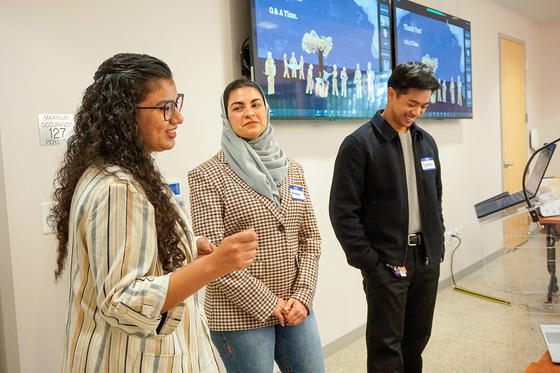One of the ways George Mason University is All Together Different is its approach to research. Students in the Center for Adaptive Systems of Brain-Body Interactions (CASBBI) NSF Research Traineeship (NRT) Program learn how to apply interdisciplinary, community-focused research to find solutions to the world’s grand challenges.

Since the program began in 2019 with the support of the National Science Foundation (NSF), the NRT Program has bought together graduate students from engineering, data science, and social science for one-year fellowships. Students work in multidisciplinary teams of other fellows and community partners to define a problem within the community and co-develop creative solutions. Thus far, 82 graduate students have participated in the five cohorts.
“No one is doing this level of interdisciplinary convergence,” explained Samuel Acuña, research professor in the Department of Bioengineering and assistant director of CASBBI. “You'll see other programs with, say, mechanical engineers working with electrical engineers, but we have groups with computer scientists, social workers, and linguists working together. Psychologists, engineers, and neuroscientists. It’s novel.”
In the program, students are assigned to groups and matched with community partners working to solve public health problems. The groups work with these partners to establish a project that will best meet their needs: This could be anything from data collection to mobile application development to further developing the work of the previous cohort.
Some groups have even continued their work long after their time in the program concludes; iConnect, an app to connect those suffering from substance abuse to local resources and support, continues beyond the program with their community partner The Chris Atwood Foundation.
“To have, say, a computer science student work with the community and think about people and problems in a way they wouldn’t otherwise, that’s the type of experience that they can draw on for years and years to come,” Acuña said. “The fellowship helps them think more deliberately about how they approach their research through a toolbox of techniques. So, when they’re done, they can approach any issue or problem they might be assigned from this perspective.”
Community-centered and human-centered research is a big draw for some NRT fellows. Morgan Lamarre, BA Dance ’22, BS Bioengineering ’24, master’s student in bioengineering and a member of the 2024-25 cohort, said, “Many of us hope that our careers are in community-facing work, so to have these skills and experience in engaging with the community will be really helpful. And these methods are different from what we see in our classrooms and labs.”
“As engineers, we’re often given a problem to solve how we want and how we think is best without input from the community, and there’s a bit of mistrust between the overall community and the scientific community as a result,” said Kirubel Tadesse, BS Bioengineering ’24, current master’s student in data analytics engineering and incoming cohort member. “But through this method, we’re actively engaging with the community and stakeholders to ensure that our designs are meeting their specific needs. We’re bridging that gap.”

“It’s a completely new way for us to approach our work,” said Brady Stinson-Smith, master’s student in bioengineering, and fellow member of the incoming cohort. “We can be so siloed in our fields, but this program helps us make the connections between not only the community, but also with researchers in other fields like sociology, psychology, and social work who can help us think better and differently about our approaches and solutions.”
This is the philosophy upon which the NRT program is built. “No one field is enough to solve these problems,” said Acuña. “The leaders of tomorrow need to know how to navigate across multiple disciplines and groups of stakeholders in order to create impactful change.”
“We all come from different approaches,” said Yosef Shaul, PhD student in kinesiology and 2023-24 cohort member. Shaul was a member of team VIRTUE (Violence Intervention and Resolution through Unifying Efforts), focused on addressing barriers to domestic violence prevention and management in Northern Virginia. “Everyone brings their own advantages and attributes. It makes the whole greater.”
Now that he has completed the fellowship, Shaul plans to adjust his research process for his PhD to incorporate more community-centered practices. “My outcomes,” he said, “will now better meet community needs.”
Related News
- February 13, 2026
- February 12, 2026
- February 11, 2026
- February 4, 2026
- February 3, 2026
